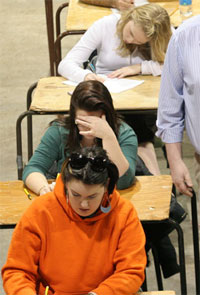 |
| Many exams are held at Dalplex. |
The exam dream is a common one, and almost everyone has experienced a version of it. For some, the dream involves signing up for courses and forgetting to show up; others dream that they're late for an important test. Some nightmares are even simpler than that, but no less terrifying: you've flunked.
This pulse-pounding anxiety usually evaporates upon waking. But for some students, no matter how much they prepare for tests and exams, the nightmare can become a stressful reality.
Dalhousie Counselling Services is doing something to help. The Exam Anxiety Reduction Program is one of several workshops and programs they offer, aimed at helping students through issues that may impact their well being or academic study.
The group is led by Dr. Jennifer Volsky Rushton. She says exam anxiety has always been around, but so has effective strategies in dealing with it.
|
She says the group focuses on how students think about exams, and aims to counteract negative associations. "The train of thought goes something like this: I'm going to blank out on the test, and forget everything I've studied. I'll get kicked out of school. I'll never get a job. I'll be poor, and living on the street." she says. "It doesn't take much to go from 'I'm not going to do well on this exam,' to 'my entire future is ruined.' It's no wonder people get anxious."
Dr. Volsky Rushton tries to counter these negative thoughts by asking students simply to provide evidence for them. "If you ask a student, 'have you failed in the past?' often, the answer is no. These are good students who have very high expectations for themselves, which then leads to a fear of failure."
In fact, the group is only for people who have well-developed study skills in the first place. "If not, that's a separate issue and there are other campus resources to provide academic help," she says.
Hand in hand with mental help is advice for dealing with the physical manifestations of stress. The group also instructs students on deep breathing and muscle relaxation techniques.
"It's one thing to get your thinking in check, but if your body is still stressed, you will not be able to relax," says Dr. Volsky Rushton. "Let's get your mind calmed down and your body calmed down as well."
For more information, contact Dalhousie Counselling Services or call: 494-2081. Dalhousie's
2007 exam period runs from December 5 to 15. Click here for the exam schedule.
